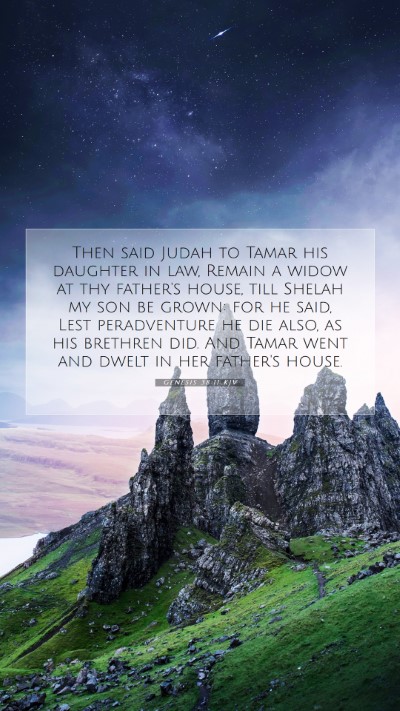Understanding Genesis 38:11
Verse: "Then Judah said to Tamar, his daughter-in-law, 'Remain a widow in your father's house till my son Shelah is grown.' For he feared that he would die like his brothers. And Tamar went and dwelt in her father's house." - Genesis 38:11
Overview
This verse is situated within the narrative of Judah and his family, particularly focusing on Tamar after Judah's sons have died. It provides insights into Judah's relationship with Tamar and reflects on the customs of levirate marriage, familial responsibility, and the socio-cultural expectations of the time.
Bible Verse Meanings
The complexities of Genesis 38:11 arise from several layers of implications regarding duty and legacy. According to Matthew Henry, this verse illustrates the significant duty of a father (or patriarch) to ensure the continuation of his line, which was paramount in ancient Israelite society.
Commentary Insights
- Matthew Henry: Judah's refusal to give Tamar to Shelah signifies both a fear of death and a misunderstanding of God’s will. He hesitates to fulfill his duty to provide Tamar with a husband, reflecting deeper parental fears and societal causes.
- Albert Barnes: Highlights the cultural context that expected brothers to marry brothers' widows. This emphasizes the responsibilities involved in family lineage, which would have included not only social customs but also spiritual implications in the continuity of the family.
- Adam Clarke: Discusses the long-term consequences of Judah's decision. By withholding Shelah from Tamar, Judah inadvertently sets a series of events into motion that lead to significant biblical historical implications, including the lineage of Christ.
Explaining the Verse
The verse reflects important themes such as:
- Family Responsibility: Judah’s decision reveals the societal expectation of caring for family and preserving lineage.
- Fear and Distrust: Judah's hesitation to allow Tamar to marry Shelah unveils a human emotion — fear of loss — which is pivotal in understanding human nature.
- Gender Roles: The verse brings to light the role of women in biblical times, particularly widows who depended on male relatives for security and continuation of family lines.
Scriptural Context
This verse fits into a broader narrative that reflects struggles within the family of Jacob (Israel) and the origins of the tribe of Judah. The focus on Tamar leads to deeper themes of justice and vindication, particularly portrayed later in the story of Ruth and ultimately the lineage of David and Jesus.
Cross References
- Deuteronomy 25:5-10: The law of levirate marriage, tying closely to the cultural expectations discussed in Genesis 38:11.
- Matthew 1:3: Genealogy of Jesus, which includes Tamar, emphasizing the importance of her role in biblical history.
- Genesis 38:1-10: Provides the broader context for understanding Judah's decisions and the events leading to Genesis 38:11.
Applying Genesis 38:11 to Daily Life
The implications of this verse carry through to modern interpretations and applications in our lives, such as:
- Understanding Commitments: Just as Judah faced the weight of family obligations, we too grapple with our commitments and responsibilities in family and community.
- Facing Fears: Judah's fear serves as a reminder that fear can often inhibit our decisions and our obligations to others.
- Gender Dynamics: This verse invites discussion about how cultural perceptions of gender roles have evolved and how we perceive familial duties today.
Conclusion
Genesis 38:11 invites readers to reflect on familial obligations, the complexities of relationships, and the social structures that dictate responsibilities. The various commentaries shed light on the cultural practices and emotional undercurrents that shape our understanding of the narrative. By examining this verse through the lenses of biblical commentary, we glean deeper meanings that resonate within our modern context.
This verse serves as a reminder of the importance of understanding scripture and the need for thorough biblical study to grasp the multifaceted messages contained within.


